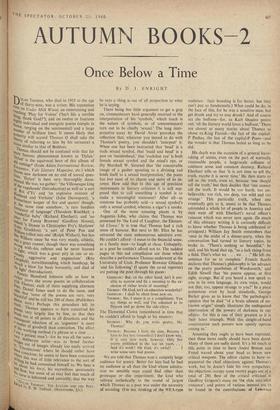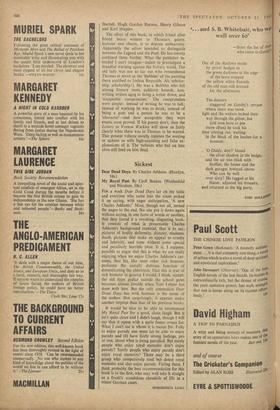AUTUMN BOOKS 2
Once Below a. Time
By D. J. ENRIGHT
DYLAN THOMAS, who died in 1953 at the age , of thirty-nine, was a writer. His reputation touching on Under Milk Wood, an entertaining and
thing 'Play for Voices' (Isn't life a terrible ht 'ng, thank God?'), and on twelve or fourteen highly individual and energetic poems (simple in
:eine, verging on the [me Intal) and ik a large "Ittober of brilliant lines. t seems lely that rh.steritY will accord Thomas (I shall take the stag similar of referring to him by his surname) a -,,itta similar to that of Beddoes.
„,
Thomas should not be confused with that far ;ore famous phenomenon known as 'Dylan.' old is the equivocal hero of this album of .d cuttings* (from Adam International Review, cif n...e'linter Yale Literary Magazine, etc.) which str.Ows new darkness on no end of unreal ques- n;118. 'Dylan' is here very thoroughly docu- oated. He was, we gather: 'the Villonesque king of ! vagabonds' (Introduction) as well as `a sort 1‘ Rimbaud d'Ys' and 'an explosive mixture of i Mu,aad and Verlaine' (John Davenport); 'a aromethean keeper of fire and secrets' though, t tradefn the same time somehow, `a rare heedless ornicator of language' (Theodore Roethke); a wonderful baby' (Richard Eberhart), and `no Pine • r for Fanny Brawnes' (Geoffrey Moore), r . (I h„ 'a Donne to Christopher Fry's Marlowe' vt,°„-,... Graddon); 'a sort of Peter Pan and lik"nern rolled into one' (Ralph Wtshart), but less aned william since 'he was very manly, athletic, wr" a great runner, though there was something to °„I18 with -his reflexes and he never learned tatre fight; which was a great pity in one so mely' aggressive aggressive and pugnacious' (Roy satr-„P,°e11), notwithstanding which handicap, he tnn""., a blow for basic humanity, and died of giant' (Introduction). 'theta Hansford Johnson tells us how in weairtliel,:, Years she wrote poems in collaboration lineil„ Thomas, each of them supplying alternate ad,°_. Daniel Jones used to do the same, and ber .that 'some of the poems are very, very we'lutlful' and he still has 200 of them. (Publishers rtiaZ Thomas Perhaps this procedure left its Doe • appears to have conceived his bre:1/1.8 very largely line by line, so that they evi-4. out at all points in all directions and the a -sequent eduction a an 'argument' is more Qiii:ntter of goodwill than conviction. The effect I an: working method ('a phrase at a, time .. . . very a Patient man')—for he was all the same a 44: deliberate artist—was to breed further a. les out of images already too easily arrived bee_uneonscious' where he should rather have whl" conscious, he seems to have been conscious "rrie this was of little relevance to the sort of lot 411,8 he had committed himself to. We hear a and ."af his hwyl, his marvellous spontaneity his .."°w; but some of us may feel that much of ....s_vese is laboured and unwieldy, that the way i------_____ 1; I) , --ilitednicN itiosimiND AND 1 III Put. 1 .
y E. W. Tedlock. (Heinemann. 25s.) he says a thing is out of all proportion to what he is saying.
There being but little argument to get a grip on, commentators have generally resorted to the interpretation of his 'symbols,' which (such is the nature of symbols, or of commentators) turn out to be chiefly 'sexual.' The long inter- pretative essay by David Aivaz provokes the reflection that, whatever you intend to do with Thomas's poetry, you shouldn't 'interpret' it. When one has been instructed that 'head' is a male sexual symbol, that 'maid and head' is a pun on 'maidenhead,' that 'cockshut eye' is both female sexual symbol and the mind's eye, or (by Marshall W. Stearns) that 'the conceivable image of a gusher spouting to a divining rod lends itself to a sexual interpretation,' the poem has lost most of its charm and more of its in- terest. How odd that in this age of precision instruments in literary criticism it is still sup- posed that to call something a symbol is to make a meaningful statement! After all—as someone has probably said—a sexual symbol's only a sexual symbol, whereas a cigar's a smoke.
One of the more amusing pieces is by Augustus John; who claims that Thomas was possessed by 'the Lord of Laughter, the Elemen- tal Clown.' It is true that Thomas had a rich sense of humour. But next to Mr. Eliot he has attracted the most unhumorous admirers ever. He couldn't afford—I mean in the financial sense, as a family man—to laugh at them. Unhappily, as a poet he couldn't afford not to. The saddest pages in this sad compilation are those which describe a performance Thomas underwent at the University of Utah. Professor Brewster Ghiselin 'and his following' (I quote the co-ed reporter) are putting the poet through his paces: GHISELIN : But, on the other hand, isn't it pos- sible to narrow and fix a meaning to the ex- clusion of richer levels of meaning?
THOMAS : Oh God, isn't an education wonderful! GHISELIN I shall be silent from now on.
THOMAS: No, I mean it as a compliment. You say things so well, and I'm ashamed to be flippant and go down the side-alleys. . .
The Elemental Clown remembered in time that he couldn't afford to laugh at his masters:
STUDENT: Why do you write poetry, Mr. Thomas?
Morons: Because I have the time. Because I have to live too; (mumbled) I don't know why. it is very slow work, however. Only five poems published in the last six years. . . . And it's work! Oh God, it's awful! . . . I write some very had poems.
We are told that Thomas won a uniquely large
audience for poetry. Better for him had he had nq audience at all than the kind whose admira- tion no sensible man could find other than grotesque or else impertinent, the kind who salivate :esthetically to the sound of jargon' which Thomas as a poet was under the necessity of avoiding. (I'm not thinking of the WEA-type audience: their breeding is far better, but they can't pay so handsomely.) What could he do, in the face of this, for he was a sensitive man, but get drunk and try to stay drunk? And of course act the buffoon—for, as Karl Shapiro points out, `all the literary world loves a buffoon.' There are almost as many stories about Thomas as about ex-King Farouk—the last of the capital- P Pashas, the last of the' capital-P Poets—and the wonder is that Thomas lasted as long as he did.
His death was the occasion of a general leave- taking of senses, even on the part of normally reasonable people, a large-scale collapse of common sense and common decency. Richard Eberhart tells us that 'it is not time to tell the truth, maybe it is never time.' He then starts to tell us the truth, even so, because 'one should tell the truth,' but then decides that 'one cannot tell the truth. It would be too harsh, too un- believable; too rich, too deep, too wild and too strange.' This particular truth, when one eventually gets to it, seems to be that Thomas astounded a whole lot of people in America and then went off with Eberhart's naval officer's raincoat which was never seen again. (In much of this obituary writing it is curiously difficult to know whether Thomas is being celebrated or arraigned.) William Jay Smith remembers that 'once in the midst of a dinner-party, when the conversation had turned to literary topics, he broke in. "There's nothing so beautiful," he said, and his hand shot up, "as a lark rising from a field. That's what we . . . we . . ." He left the sentence for us to complete.' Francis Scarfe declares that Thomas's philosophy is 'an advance on the pretty pantheism of Wordsworth,' and Edith Sitwell that `his poems appear, at first sight, strange. But if you heard a tree speak to you in its own language, its own voice, would not that, too, appear strange to you?' In a piece portentous even by local standards, George Barker gives us to know that 'the pathologist's opinion that he died "of a brain ailment of un- known origin" simply illustrates the undisguised intervention of the powers of darkness in our affairs: for this is one of their greatest as it is their latest triumph. With this sleight-of-hand assassination such powers now openly operate among us.'
Assuming they ought to have been reprinted, then these items really should have been dated. Many of them are sadly dated. It's a bit much at
this point in time to have Andrd Breton and Freud waved about your head as brave new critical weapons. The editor claims to have re-
presented the chief objections against Thomas's work, but he doesn't hide his own sympathies: the objections occupy some twenty pages out of a total of 280. Best of the critical criticism is Geoffrey Grigson's essay on 'the slide into idiot romance'; and points of various interest are to be found in the contributions of Lawrence
Durrell, Hugh Gordon Porteus, Henry Gibson and Karl Shapiro.
The effect of this book, in which friend after friend bears witness to Thomas's gaiety, humour and charm, is to depress unbearably. Apparently the editor intended to distinguish between the Legend and the Poet. He has merely confused them further. What the publisher in- tended I can't imagine—unless to promulgate a dreadful warning against the literary world. The old lady was not so far out who remembered Thomas at seven as the 'Bubbles' of the painting (here ascribed to Joshua Reynolds. Ah, scholar- ship, scholarship!). He was a Bubbles who fell among literary touts, publicity hounds, non- writing writers agog to bring a writer down, and 'acceptable compromises.' The compromises were simple: instead of writing he was to talk; instead of working he was to drink; instead of being a poet and a person he was to be a `character'—and how acceptable they were events soon proved. If his poems don't, then the Letters to Vernon Watkins will show us fairly clearly what there was in Thomas to be wasted. This present volume mostly itemises the wasting or sickens us with high-sounding and false ex- planations of it. The vultures who fed on him alive still feed on him dead.



















































 Previous page
Previous page